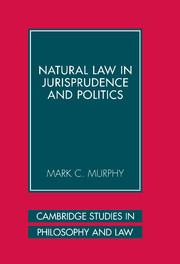Book contents
- Frontmatter
- Contents
- Acknowledgments
- Natural Law in Jurisprudence and Politics
- Introduction: Natural Law Jurisprudence and Natural Law Political Philosophy
- 1 Natural Law Jurisprudence Formulated
- 2 Natural Law Jurisprudence Defended
- 3 The Common Good
- 4 The Natural Law Rejection of Consent Theory
- 5 A Consent Theory of the Authority of Law
- 6 The Authority of Law and Legal Punishment
- 7 Beneath and Beyond the Common Good
- Works Cited
- Index
7 - Beneath and Beyond the Common Good
Published online by Cambridge University Press: 10 March 2010
- Frontmatter
- Contents
- Acknowledgments
- Natural Law in Jurisprudence and Politics
- Introduction: Natural Law Jurisprudence and Natural Law Political Philosophy
- 1 Natural Law Jurisprudence Formulated
- 2 Natural Law Jurisprudence Defended
- 3 The Common Good
- 4 The Natural Law Rejection of Consent Theory
- 5 A Consent Theory of the Authority of Law
- 6 The Authority of Law and Legal Punishment
- 7 Beneath and Beyond the Common Good
- Works Cited
- Index
Summary
Two Challenges to the Common Good Principle
Recall that natural law political philosophy takes as its central normative concept that of the common good (0.1). It is the common good, that is, that ultimately provides the normative force for law, rendering it (under suitable conditions) authoritative. And so the common good must be something that there are very strong reasons to promote and protect, and the common good principle (that is, the requirement to do one's share with respect to the common good of one's political community) must be a principle that there are decisive reasons to honor (3.6). For the demands of the common good principle are supposed to explain the normative demands of the law; consent, though necessary (4.7), is relevant only because we must appeal to consent to explain why to flout the law is to flout the common good principle (5.5).
It was in light of this normative role that the natural law view I have defended selects the aggregative conception of the common good: for what this natural law view needs is a conception of the common good that carries sufficient normative weight that it can underwrite the decisive force of the common good principle, and the aggregative view both makes a plausible case on its own account (3.2) and clearly fills this role better than the alternative natural law conceptions on offer (3.3, 3.4).
- Type
- Chapter
- Information
- Natural Law in Jurisprudence and Politics , pp. 168 - 176Publisher: Cambridge University PressPrint publication year: 2006
- 1
- Cited by



